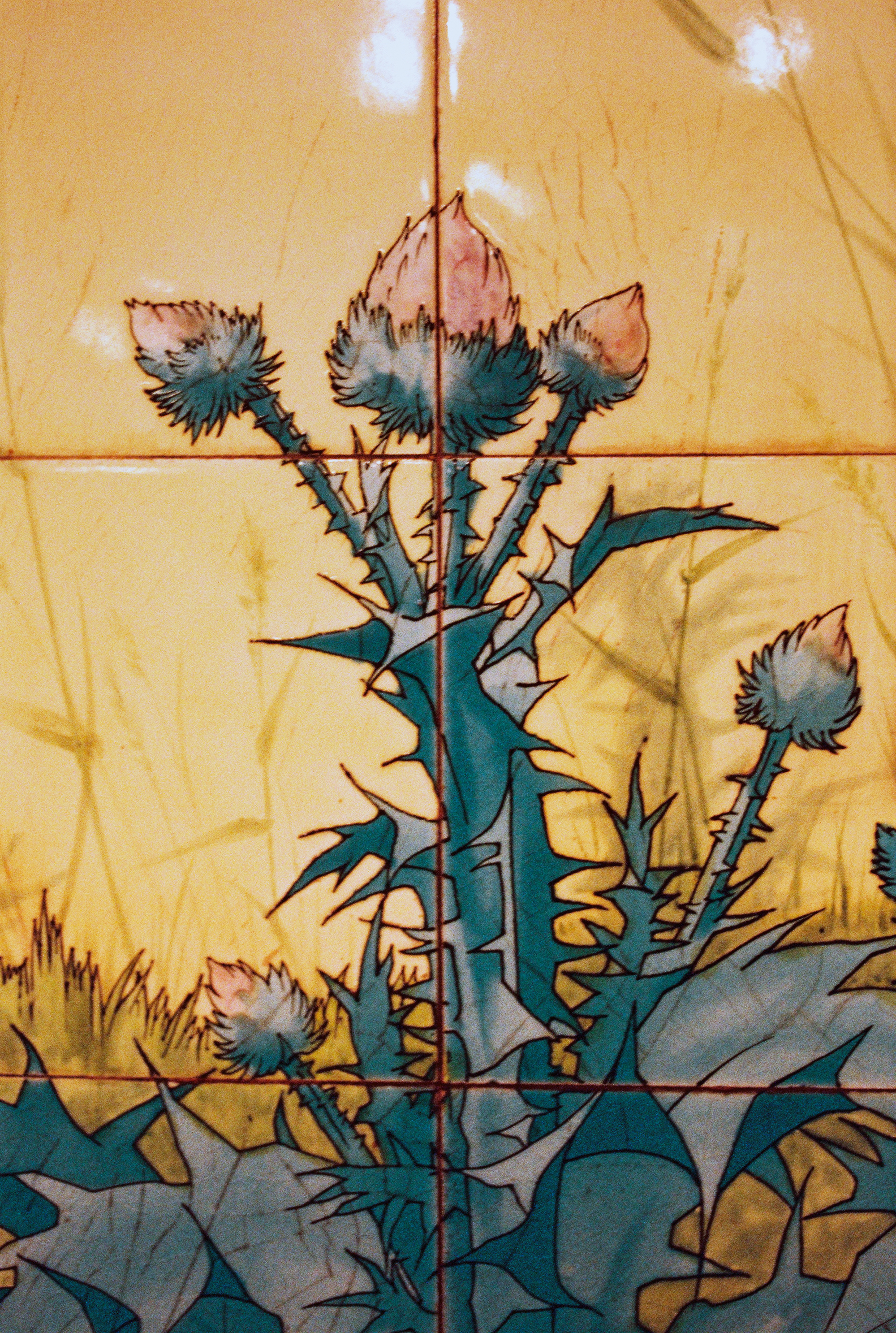Purple Magazine
— F/W 2016 issue 26
Pascal Greggory
photography by GIASCO BERTOLI at the Brasserie LIPP
interview by SIMON LIBERATI
style by ROBERT RABENSTEINER
Gold chains and medallion DARY’s and Hamsa Padlock charm pendant and Ottoman Architecture ring SEVAN BICAKCI, worn throughout
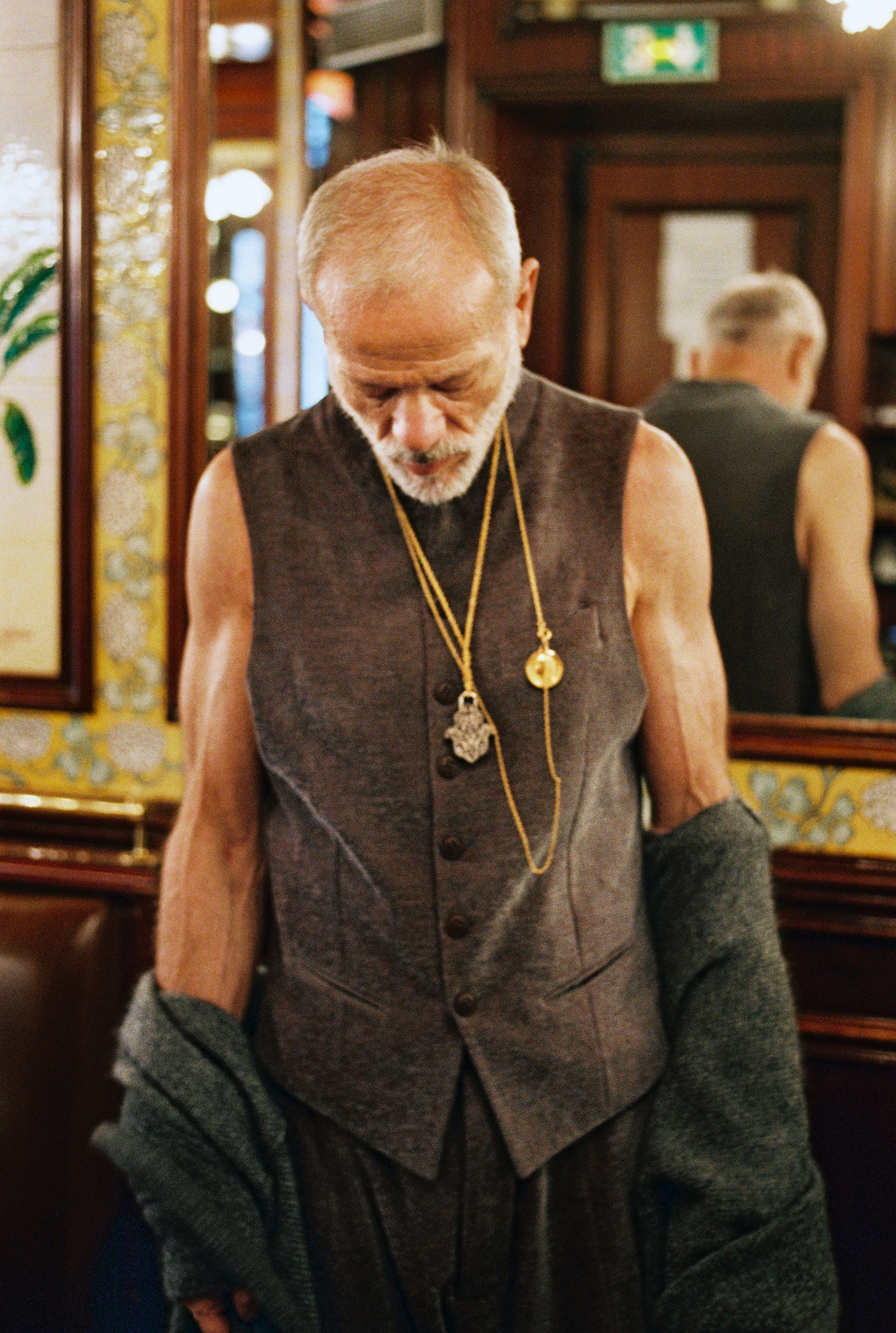 A gray Jacquard mohair wool cape over an alpaca and wool vest and pants GIORGIO ARMANI
A gray Jacquard mohair wool cape over an alpaca and wool vest and pants GIORGIO ARMANI
Pascal Greggory’s discreet presence at a Paris party or club has always signaled that you’re in the right place. For years, he was the promising young male lead, playing in André Téchiné’s The Brontë Sisters (1979) and later in many of Éric Rohmer’s films, notably Pauline at the Beach (1983). Public success arrived when his lover and mentor, theater director Patrice Chereau, cast him in Hamlet (1988). Today, the elegant French star continues to enliven the Paris scene. He is one of the most valued actors in France, on film and on stage.
SIMON LIBERATI — The first time I saw you was in 1977 at a movie theater on the Champs Elysées that was showing The French Woman [Madame Claude]. You were playing the son of Klaus Kinski, and you were getting deflowered on a yacht by Dayle Haddon. Do you remember?
PASCAL GREGGORY — Yes. It was my second film. I was lucky. I started off with two box-office smashes: The French Woman and Docteur Françoise Gailland [laughs].
SIMON LIBERATI — Ah yes, with Annie Girardot… Yes, Annie Girardot was a big star at the time, but I didn’t like that film as much. I liked The French Woman better.
PASCAL GREGGORY — Docteur Françoise Gailland was a phenomenal success. Annie was kind with me. I did a play with her, too — a play by Roberto Athayde, directed by [Jorge] Lavelli. That was my first time doing any theater. She’d be all alone onstage, and she’d slap me… The play was called Madame Marguerite. Since I didn’t have any lines, I was allowed only a single bow.
SIMON LIBERATI — Let’s get back to the other madam, The French Woman. Dayle Haddon was gorgeous.
PASCAL GREGGORY — Yes. I had a nude scene with her [laughs]. I was falling in love.
SIMON LIBERATI — As I recall, you weep on your windsurfing board when you find out she’s a call girl. And right then, we hear the Jane Birkin song.
PASCAL GREGGORY — Yes, except that I couldn’t cry on command back then, so what’s-his-name, the director, Just Jaeckin, told me to splash some saltwater on my face, to fake some tears.
SIMON LIBERATI — I just recently watched the film again on television. It’s retained its charm. How were things on set?
PASCAL GREGGORY — We were on the coast and in the Antilles, I think. Just Jaeckin had everyone fly coach. I was young and didn’t care, but the others weren’t too pleased [laughs]. I was 20 at the time, you know, and just so astonished to be working in cinema. It was unexpected. I was like a kid.
SIMON LIBERATI — You come from a bourgeois background. Your father was an industrialist, but what kind?
PASCAL GREGGORY — He was an engineer. He invented rubber road-surface markings. He’s the reason there aren’t any studs in pedestrian crosswalks anymore. He also made the yellow lines on highways and at airports… The theater was a way to slip that Protestant yoke. I was undoubtedly predisposed to it. When I was little, I recreated the entire Kennedy burial in my bedroom. I played all the roles: the dead man, Jackie Kennedy, the young son [laughs].
SIMON LIBERATI — You lived in the 16 th arrondissement.
PASCAL GREGGORY — Yes, because my father had his offices in Colombes.
SIMON LIBERATI — You often windsurf in your films. Aside from the scene in The French Woman, it seems to me you give lessons to Arielle Dombasle in Éric Rohmer’s Pauline at the Beach, no?
PASCAL GREGGORY — [Laughs.] Yes, it’s true. But those are the only two times.
SIMON LIBERATI — Had you made any progress from 1977 to 1983?
PASCAL GREGGORY — You must be joking. Éric got me some lessons. Since it was Les Films du Losange producing, the lessons were on the Lac d’Enghien [laughs]. The Lac d’Enghien is calm, with just a breath of wind. There I was a regular pro. But when I got to Granville, I fell flat on my face. They’d barely called “Roll camera!” and down I went. We did three or four takes like that. There was one where I managed to stay up for 15 seconds, so he put that one in the can.
SIMON LIBERATI — Let’s get back to your real debut, your first big role in the movies, in André Téchiné’s The Brontë Sisters [1979].
PASCAL GREGGORY — I owe that one to Adolfo Arrieta. I’d met him at Le Sept. Adolfo would take in young actors from the Parisian nightclub scene. He enjoyed that. I did Flammes with Caroline Loeb [1978]. Téchiné was a fan of Arrieta. But it wasn’t enough. Me, I wanted to work. My ambition was … big. My agent at the time was absolutely smitten with another actor — same age, same roles as me. Everyone knew Téchiné was developing a film and looking for a young man. So my agent touted the other guy. I said I’d like to meet Téchiné, too. But my agent said: “No. He adores the other guy.” One day, I went to the agency and found the secretary had stepped out — probably to the john — so I opened the agenda on the desk. I saw Téchiné’s telephone number and jotted it down. When I got back home, I called and made an appointment, and then I got the role. So I called my agent and told him: “Well, I got the role. Too bad it won’t be you talking terms for the contract.” And I signed on with Artmedia.
 Dutch floral Jacquard oversized tapestry coat ALEXANDER MCQUEEN over a black wool turtleneck BOTTEGA VENETA
Dutch floral Jacquard oversized tapestry coat ALEXANDER MCQUEEN over a black wool turtleneck BOTTEGA VENETA
SIMON LIBERATI — Who was the other actor?
PASCAL GREGGORY — [Long, reluctant pause.] It’s a sad story. He’d started off very strong, with great directors, but he didn’t do The Brontë Sisters. —
SIMON LIBERATI — You know, right around the time of The Brontë Sisters, I heard about you from Jean Bernard, a guy who’d sold you an old American car, of the American Graffiti kind. Do you remember?
PASCAL GREGGORY — Absolutely. I had a 1956 Ford Fairlane Victoria. But I can’t remember who sold it to me.
SIMON LIBERATI — I can tell you. It was Jean Bernard. He had a shop on Place Sainte-Opportune called Les Messageries. He sold 1950s American clothing and old Ernest high heels. He used to date Robert Taylor’s niece. Since you’re interested in Kennedy’s death — he had the same model Lincoln convertible that Kennedy was assassinated in, but in yellow. Were you happy with your Ford?
PASCAL GREGGORY — Yes. She was lovely. It was just for show, but she was marvelous. She had an 8-track tape deck.
SIMON LIBERATI — You like cars. One day you told me that Marisa Berenson had loaned you her Mini.
PASCAL GREGGORY —Yes. It was David de Rothschild who’d given it to her. It was a sublime car: eggplant-purple and white, with an all-leather interior in eggplant and white, and wood all over the place. Marisa was very sweet and loaned it to me.
SIMON LIBERATI — You really like Marisa?
PASCAL GREGGORY — Oh, I adore Marisa. I love her voice. [Suddenly serious.] You know, I don’t feel I’ve had a very amusing life. Once we start talking this way, once you start interviewing me about things in my life, I feel I should have amusing things to say, but in fact I’ve had a normal life, nothing too … unconventional. I’ve lived the hard worker’s life. Where I’ve been fortunate is in meeting great people. I’ve worked with all those people: Téchiné, Rohmer, and on down the list.
SIMON LIBERATI — There was [Patrice] Chéreau, too. It seems to me he’s very important to you, no?
PASCAL GREGGORY — Yes, because I lived with him as well.
 Red silk wool jacket and pants with a blue shirt GUCCI
Red silk wool jacket and pants with a blue shirt GUCCI
SIMON LIBERATI — Was it an important moment in your career when you did Bernard-Marie Koltès’s Dans la Solitude des Champs de Coton [In the Loneliness of the Cotton Fields] in the theater?
PASCAL GREGGORY — Hugely important.
SIMON LIBERATI — He’d done it with Laurent Malet previously?
PASCAL GREGGORY — He’d premiered it with Laurent Malet and Isaac de Bankolé, but it had pretty much gone under the radar. Many years later, Patrice said to me: “I’d like to restage Dans la Solitude des Champs de Coton, but this time with you. We’re going to simplify everything. I’m going to redirect it from scratch. It’ll be more naturalistic and psychological.” And it was a hit.
SIMON LIBERATI — Were you part of Chéreau’s school at the Amandiers?
PASCAL GREGGORY — No, I was never at the Amandiers, for the simple reason that I was too old. The whole Amandiers gang — Vincent Pérez, Valeria [Bruni Tedeschi], Eva [Ionesco], etc. — they’re all 10 years younger than me.
SIMON LIBERATI — How did you meet Chéreau?
PASCAL GREGGORY — We had a few friends in common. One evening, I went to the theater. Not knowing Chéreau’s work very well, I went to see Marivaux’s La Dispute, at Porte Saint-Martin. Along with Bob Wilson, that was one of the two theatrical shocks of my life. That night, I said to myself, “I want to work with this man.” It was every actor’s dream to work with Chéreau, but I said to myself: “I want to be the only one. No one except me is going to work with Chéreau.” It was utterly stupid [laughs]. I went to all the shows. I remember going to see Peer Gynt in Lyon. I made the round-trip on a Sunday. Four hours of theater. I’d taken the train in the morning, and that evening it was Chéreau himself who accompanied me to the station so I could catch my train home. So there was already a little something between him and me. Time passed. One night, I was having dinner alone and in great despair at Natacha, the restaurant on Rue Campagne Première. I’d just gotten out of a disastrous theatrical premiere and was crestfallen. “How could this happen?” I asked myself. “This is not the world I want to live in. I don’t want to be doing stuff like this.” In walked Chéreau, alone, and a little feverish himself. I said to him: “How’s it going, Patrice? You alone? Come have dinner with me.” That’s how it started. “Everything is fortuitous except for chance.” That’s not my line — Rohmer said that.
SIMON LIBERATI — It mustn’t have been easy with Chéreau.
PASCAL GREGGORY — No. Not with me, either, you know. I’m not an easy person. Each of us had found his master. I started easing him out of his somber, romantic, mortiferous world. I was more happy-go-lucky. I’d go out and have a lot of fun. This was in the waning years of Le Palace. I brought a bit of gaiety into his life. He started having people over for dinner, something he never did. I sort of nudged him toward respectability. Which wasn’t a bad thing because he’d gotten so somber. Afterwards, we did all the work we did together: Queen Margot, Gabrielle, and so on.
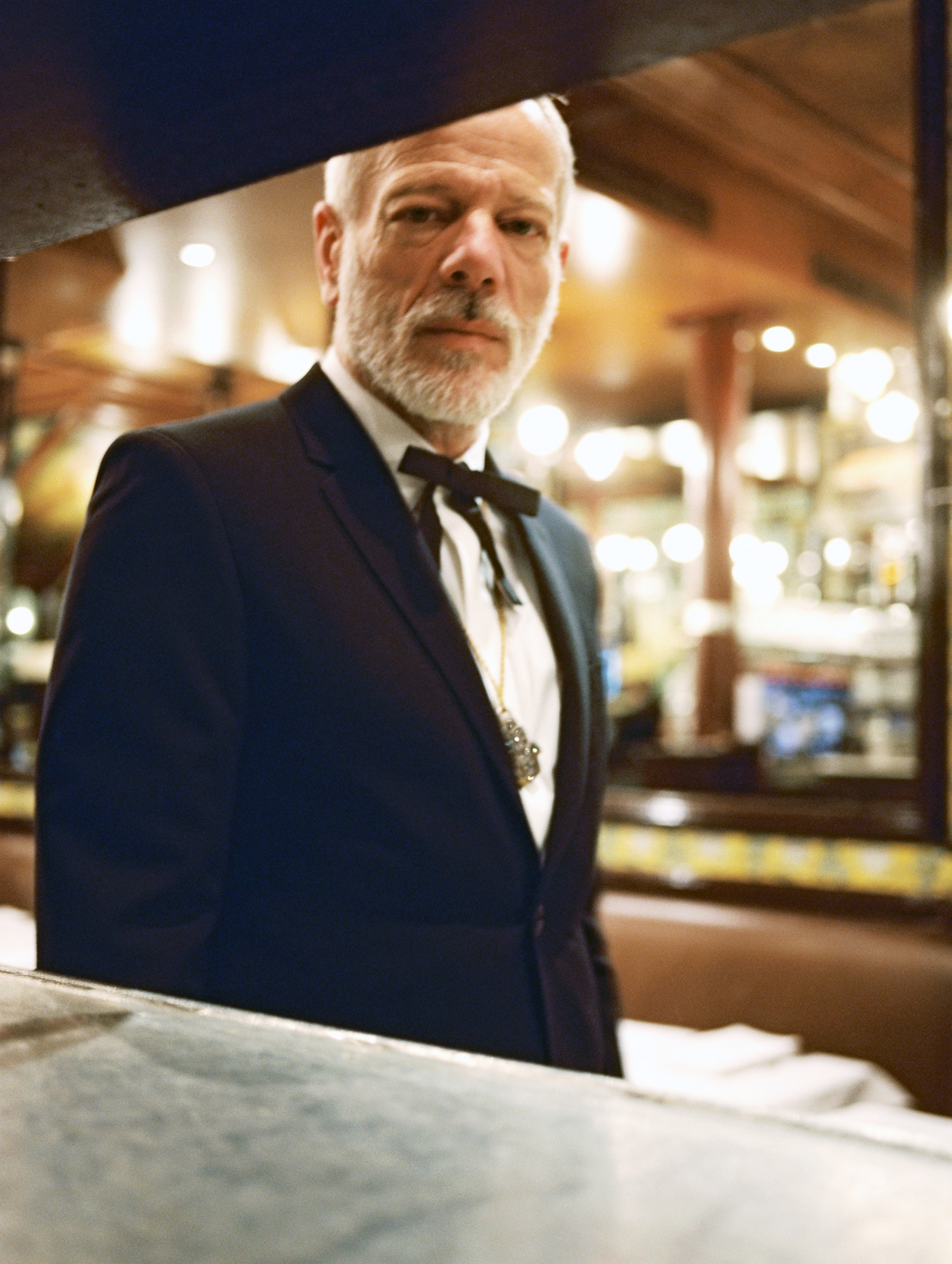 Black wool serge suit with a white cotton shirt and a silk faille bow tie DIOR HOMME
Black wool serge suit with a white cotton shirt and a silk faille bow tie DIOR HOMME
SIMON LIBERATI — Did he influence your technique?
PASCAL GREGGORY — Yes. He taught me to underscore my flaws and always to make my characters older. Never younger. In aging a character, you mature him and get him to grow. You bring in imaginary things that the character might never have lived, but it doesn’t matter.
SIMON LIBERATI — Your other great encounter was Rohmer?
PASCAL GREGGORY — Yes. I first worked in two plays directed by Rohmer. One was [Heinrich von] Kleist’s Katie of Heilbronn in Nanterre, with Pascale Ogier and Arielle Dombasle, just before Patrice took charge of the Amandiers. I was in my dressing room one day and heard a knock. It was Éric. He produced a wallet from his jacket and flashed it open in front of me. I just managed to catch a glimpse of a photograph. Then he closed the wallet and left. I understood that it was a photo of his son. I understood that I looked like his son, and I understood that I was part of his family.
SIMON LIBERATI — I never knew Rohmer had a son.
PASCAL GREGGORY — He has two sons.
 Gray Winter trench coat over slim military pants with a silver charm necklace and ring LOUIS VUITTON and black velvet cowboy boots GIVENCHY by RICCARDO TISCI
Gray Winter trench coat over slim military pants with a silver charm necklace and ring LOUIS VUITTON and black velvet cowboy boots GIVENCHY by RICCARDO TISCI
SIMON LIBERATI — And what do they do?
PASCAL GREGGORY — Nothing to do with the movie business. They’re professors or doctors — I don’t know. But nothing to do with movies. He’d have killed his children had they wanted to work in movies. Cinema was disgraceful; that’s why he changed his name. His name was Schérer. He didn’t want his mother to know he was making movies. He had a brother who was a philosopher.
SIMON LIBERATI — Yes. René Schérer. It was Djemila who gave me news of him. He’s over 90, but I think Djemila still sees him.
PASCAL GREGGORY — Ah, Djemila, yes. I saw her recently.
SIMON LIBERATI — Me, too. I wrote an article on Edwige [Belmore] for Vanity Fair, for which I was denounced as a snake.
PASCAL GREGGORY — By Djemila? Nothing out of the ordinary. Those girls from Le Palace are all jealous. Djemila, even Eva. Djemila and I met at Philippe Morillon’s house, with Paquita [Paquin]. And — to get back to the theater — it was also at Philippe’s house that I met Christophe Bernard, who was part of the Amandiers troupe.
SIMON LIBERATI — Christophe was handsome and charming. He started going out very young, at 15. I remember well because he lived at my place and would swipe scooters on Rue Saint-Denis.
PASCAL GREGGORY — Yes. I liked him a lot. I acted with him in one of Rosette’s films — you know, still within the Rohmer gang. Rosette made some short films, in which I was always playing her fiancé, and I think Christophe played in one of them. At Les Halles. I think the title is Rosette Cherche une Chambre.
SIMON LIBERATI — The Rohmer gang was very close. You really spent some time together.
PASCAL GREGGORY — Yes. We were always getting together with Arielle, Marie Rivière, Rosette. At one point, I was seeing a lot of Pierre Clémenti as well. I played in one of his short films. It was a very daring work, somewhat mystical — a bit like Clémenti himself. I loved Pierre. I really, really,really loved him. He was very poetic, very smart. Like a comet, something outside the flow of time.
SIMON LIBERATI — I recall a film you did from a script written by a pal of mine. An adaptation of his book. Zonzon. You played a habitual offender.
PASCAL GREGGORY — Ah yes, I remember quite well. Laurent Bouhnik, the director, didn’t think I could play a jailbird. So I said, “Yes, I can.” I convinced him, and I won a role intended for another actor.
SIMON LIBERATI — Did you, now!
PASCAL GREGGORY — Yes. That’s the way it often goes with success [laughs]. As I recall, I had two coaches: a gym coach who’d come over every morning to beef me up and a real ex-con who’d done 30 years in prison. He told me a funny story about keeping 15,000 francs cash in his socks whenever he was on the lam. So it was a friend of yours who wrote that book?
SIMON LIBERATI — Yes. Patrick de Lassagne. He’s got a particle in his name, but he’s the son of a Jamaican cab driver. A good guy, and a great rock-n-roll dancer. He’d served some time for attacking tourists with a machine gun in the South of France [laughs].
PASCAL GREGGORY — And he liked the film?
 Brown leather trench coat over a black cashmere turtleneck BOTTEGA VENETA
Brown leather trench coat over a black cashmere turtleneck BOTTEGA VENETA
SIMON LIBERATI — Yes. He’d also written the script. Are you working on a series right now?
PASCAL GREGGORY — Yes. Section Zéro, with Olivier Marchal, on Canal+. It’s going well. It’s a sort of sciencefiction film.
SIMON LIBERATI — You play the bad guy.
PASCAL GREGGORY — Yes. A very, very bad guy. A handsome bad guy, the kind you love to hate [laughs]. In a little while, I leave for Liège, where I’m filming a movie. It’s the story of a doctor married to a very beautiful woman… An actress. I can’t remember her name, but it’s her first film role. She’s not young, but she’s very beautiful and very mysterious. I find out she has a lover. I scheme a way to draw the lover to my clinic, make him believe he has cancer, and treat him for a cancer he doesn’t have. I prescribe radiation treatments and other stuff.
SIMON LIBERATI — That’s horrible!
PASCAL GREGGORY — Horrible. It’s taken from a book.
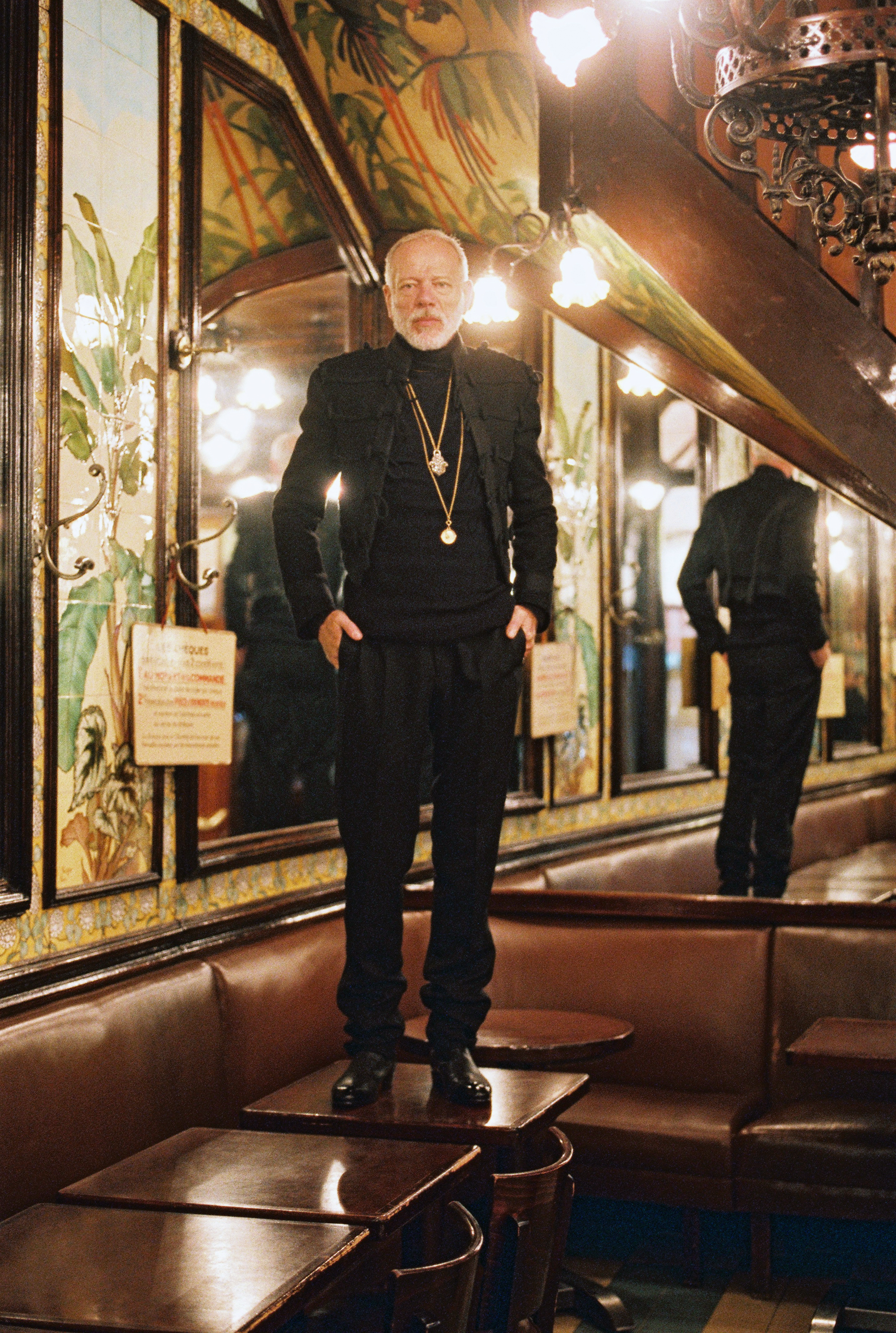 Black bolero jacket and pants with a cashmere sweater RALPH LAUREN COLLECTION and leather ankle boots SANTONI
Black bolero jacket and pants with a cashmere sweater RALPH LAUREN COLLECTION and leather ankle boots SANTONI
SIMON LIBERATI — You’re the bad guy again.
PASCAL GREGGORY — You know, there are always mitigating circumstances in the bad guy’s life! He loves his wife.
SIMON LIBERATI — That mysterious woman whose name you don’t remember.
PASCAL GREGGORY — She’s French… Ah, I remember now. Moana Ferré is her name. There are some very well-known Belgian actors in it. Fabrizio Rongione, playing alongside the Dardenne brothers.
SIMON LIBERATI — Before you started specializing in bad guys, between Rohmer and Chéreau in 1984, you played Prince Charming in a very famous musical comedy for children by Philippe Chatel: Émilie Jolie.
PASCAL GREGGORY — Oh yeah, with great costumes by Thierry Mugler! Yes. It was Robert Fortune directing. That was a huge success, at the Cirque d’Hiver, with Ginette Garcin. It was fun because I was singing and dancing live with an orchestra.
 Wool serge suit with a white cotton shirt and a silk faille bow tie DIOR HOMME
Wool serge suit with a white cotton shirt and a silk faille bow tie DIOR HOMME
SIMON LIBERATI — In fact, you’ve been working steadily since 1976.
PASCAL GREGGORY —There’s a line of Truffaut’s that’s always floating around in my head: “An actor who doesn’t work isn’t worth a damn.”
SIMON LIBERATI — That’s harsh!
PASCAL GREGGORY — Yes! Every time I find myself without a job, I think of that line. It gives me a real swift kick in the ass, and I go find some work.
SIMON LIBERATI — Are there limits to what you’ll do?
PASCAL GREGGORY — Yes, there are limits. I know a director who makes hits, but what he makes is awful, just awful. He offered me one of his leading roles. I met him at the Plaza… [Breaking off the story.] This fails to amuse you because there’s no name attached…
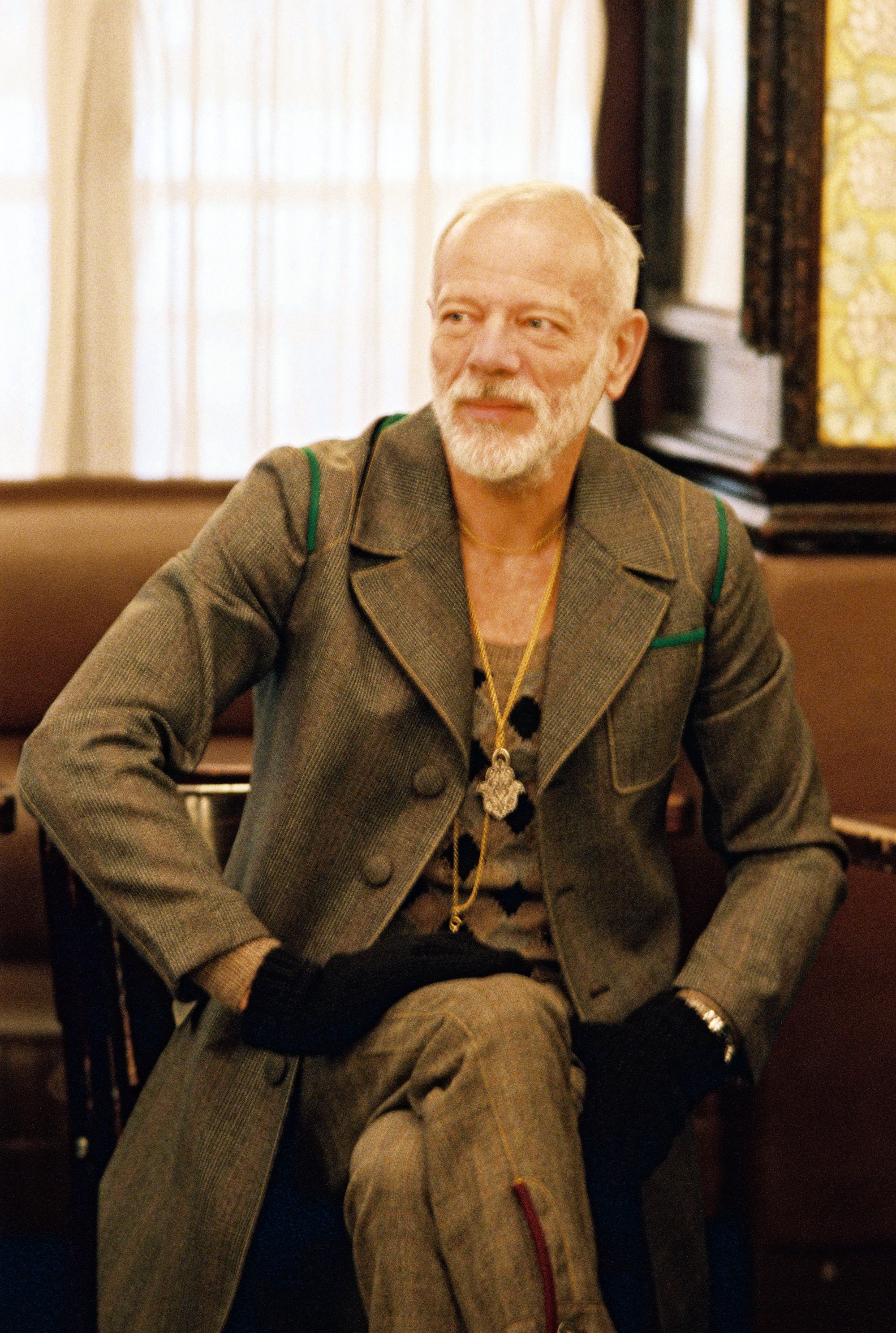 Prince of Wales checkered wool coat and pants with an alpaca knit vest and black wool gloves PRADA and Pascal’s own watch
Prince of Wales checkered wool coat and pants with an alpaca knit vest and black wool gloves PRADA and Pascal’s own watch
SIMON LIBERATI — No, no. Go ahead…
PASCAL GREGGORY —Well, I left the Plaza and said to myself: “No way. This is something I cannot do.” It turns out I have my head screwed on straight, after all. I think I have some taste, at least. I won’t say I have good taste, but I have a style, and I stick with it.
SIMON LIBERATI — What exactly was your role in Émilie Jolie? I don’t know the script very well.
PASCAL GREGGORY — I play a garbage man, and toward the end I take off all the gray foam Mugler clothes, the big shoes … and end up in sparkling white-leather clothes with rhinestones. I’m suddenly the Prince Charming the little girl has been looking for since the beginning.
SIMON LIBERATI — I had totally forgotten it was Mugler who’d done the costumes.
PASCAL GREGGORY — Back then, I’d see him all the time. He was visible.
SIMON LIBERATI — Yes. He wasn’t Manfred yet.
PASCAL GREGGORY — Ah, no. Not at all. No one foresaw that phenomenal transformation. It’s a shame not to see him anymore. I liked him a lot. We got on very well. He was very charming. I used to see him a lot at Natacha. All the time.
SIMON LIBERATI — You’re more of a Natacha guy than a Davé guy?
PASCAL GREGGORY — Yes, because Natacha’s where all the theater people went. Davé was a bit jetset. It was too chic for me.
SIMON LIBERATI — Not your crowd.
PASCAL GREGGORY — No. Me, I liked Natacha and Le Sept. Rue Sainte-Anne was a blast. There was Gérald Nanty’s Colony, and Le Sept, and then the club [Yves] Mourousi used to go to, which was a bit on the queer side, and Isolde Chrétien was across the street.
SIMON LIBERATI — Ah! Isolde Chrétien.
PASCAL GREGGORY — She must be dead by now. The first stewardess! She owned that bar called Scotch, or something. And then there were the male hookers.
 Jacquard knitted wool coat over midnight green wool flannel pants ERMENEGILDO ZEGNA COUTURE
Jacquard knitted wool coat over midnight green wool flannel pants ERMENEGILDO ZEGNA COUTURE
SIMON LIBERATI — Yes, like at the Drugstore.
PASCAL GREGGORY — Absolutely, and at the Trocadero.
SIMON LIBERATI — And at Porte Dauphine.
PASCAL GREGGORY —Yes. I’ve got a funny story about the Bois de Boulogne. So we’re driving back from the Garches hay festival and Virginie Thévenet’s house. Romain Brémond and Philippe Krootchey are in the car. We stop along the way because we want to see the exhibitionists near the Russian Embassy. I’m in the back seat, with Éric Buche. Romain and Krootchey are up front. So we stop, but nobody seems to even notice us, since there’s no girl, no exhibitionists. We’re just about bored to death and ready to leave when Krootchey gets an idea: “I’m going to wrap a scarf around my head. That way they’ll think I’m a girl. And I’ll fake a blowjob!” And then, like a miracle, there’s suddenly a swarm of men gathered around the car. And in the middle of the swarm we hear, “It’s the cops!” They took us all in. At the station, the police officer turns to us and in his South-of-France accent says, “You do know it’s against the law to be having oral coitus in public, right?” [Laughs.]
END
